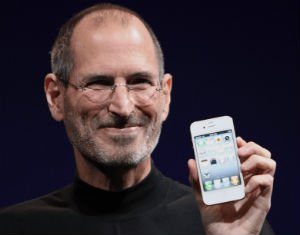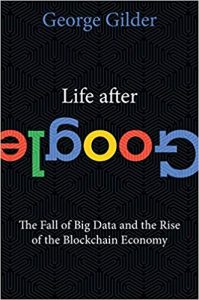There’s life after Google! Big Tech’s Achilles’ heel
In 1981, his bestselling “Wealth and Poverty” provided a blueprint for the economic revolution led by Ronald Reagan, who cited him more than any other living author. In the 1994 version of his book “Life After Television, he predicted the digital world in which we now live and the invention of the smartphone that now dominates daily life. And long before the iPhone was introduced in 2007, Apple founder Steve Jobs read “Life After Television” and passed it on to his colleagues.
Now, building on his remarkably prescient track record, George Gilder – regarded as one of the leading economic and technological thinkers of the past four decades – is making a new, bold prediction.
In “Life After Google,” Gilder contends the age of the tech giants and their centralized, top-down hierarchical world is about to end, largely because their worldview is “fundamentally flawed.”
He explained in an interview with WND that the brilliant entrepreneurs who formed Google, Sergey Brin and Larry Page, and other tech innovators have a vision that goes far beyond profits and technological progress, noting they speak of their aims in prophetic and religious terms.
Their ultimate objective is to create a new “system of the world,” Gilder said, in which all of its data is compiled in a single “place” to be analyzed by increasingly sophisticated algorithms that transcend the human mind’s capabilities.
But Gilder contends this “flat-universe theory of materialism” is the fundamental flaw, describing it as a deterministic “neo-Marxist political ideology” that considers the universe sheer matter, ruled by physics and chemistry, leaving little room for human consciousness and creativity.
“Marx essentially believed that humans had solved the problem of production back in the 19th century with the first industrial age, and in the future the challenge would be distributing wealth rather than producing it,” Gilder explained to WND.
“I see Google making the same error in the 21st century, imagining they’ve solved the problem of production in the future with robotics and machine learning and artificial intelligence, and in the future the only problem will be redistribution of wealth.”
Gilder said Google’s “arrogance even exceeded Marx, because Marx didn’t imagine that the new technology would eclipse the human mind.”
“But Google imagines that its architecture will achieve a singularity that will eclipse human intelligence,” he told WND, referring to the concept promoted by futurist Ray Kurzweil and others of a technological, artificial “superintelligence.”
“But we shouldn’t mind,” Gilder added in jest, “because we can all leave for the beach and collect a guaranteed annual income while Brin and Page, and Elon Musk fly to other planets in a winner-take-all universe.”
Imagining the smartphone

Gilder told WND he began studying microchips at the very end of writing “Wealth and Poverty,” which sold millions of copies and became the No. 1 book in France for six months.
The microchip presented the possibility of putting a whole computer on a single sliver of silicon the size of a fingernail capable of being switched billions of times a second.
With that premise in mind, he envisioned the smartphone 13 years before it was introduced to the world.
“I just imagined a device that anyone would like to have,” he told WND. “I said it would be as portable as your watch, as personal as your wallet. It would recognize speech, it would navigate streets, it would collect your news and your mail; but it just might not do Windows.”
Gilder noted he made the Windows reference in a speech at a Microsoft conference.
“So, I was sort of being provocative about the likely decline of the Microsoft empire,” he said.
“I was right about Microsoft, and I think I’m right about Google.”
‘Unexpected bits’

Gilder affirmed that the premise of “Life After Google” reflects, in part, his co-founding of the Seattle-based Discovery Institute, which in addition to being an economic think tank is known as the chief promoter of the theory of intelligent design.
He affirmed that if carried out to its logical conclusion, Google’s future is “dystopian to the extent that they eclipse the creativity of human beings and imagine that essentially their new machines make humans obsolete.”“They really don’t grasp information theory,” he said, noting it’s a central theme of the Discovery Institute.
“The creation of the universe is really beyond our grasp,” he said. “Intelligent design is just a way to show that the universe is created, and human beings in subsets are creative in imitation of their creator.”
He points to a set of propositions underlying the internet articulated by Claude Shannon, the American mathematician known as the “father of the internet.”
“The computer and all these great information technologies relies ultimately on a definition of information as surprise, as unexpected bits,” Gilder said.
Gilder also cites the 20th century German-born economist Albert Hirschman.
“He said creativity always comes as surprise to us. And if it didn’t, we wouldn’t need it,” said Gilder.
And, Gilder added, if it didn’t, “socialism would work.














